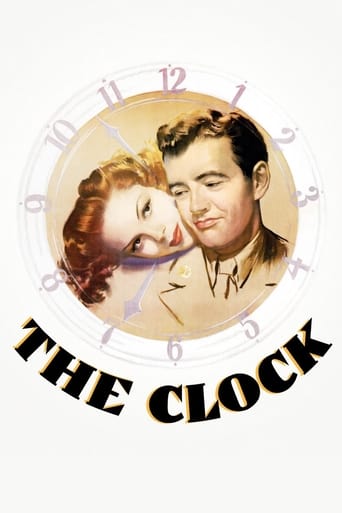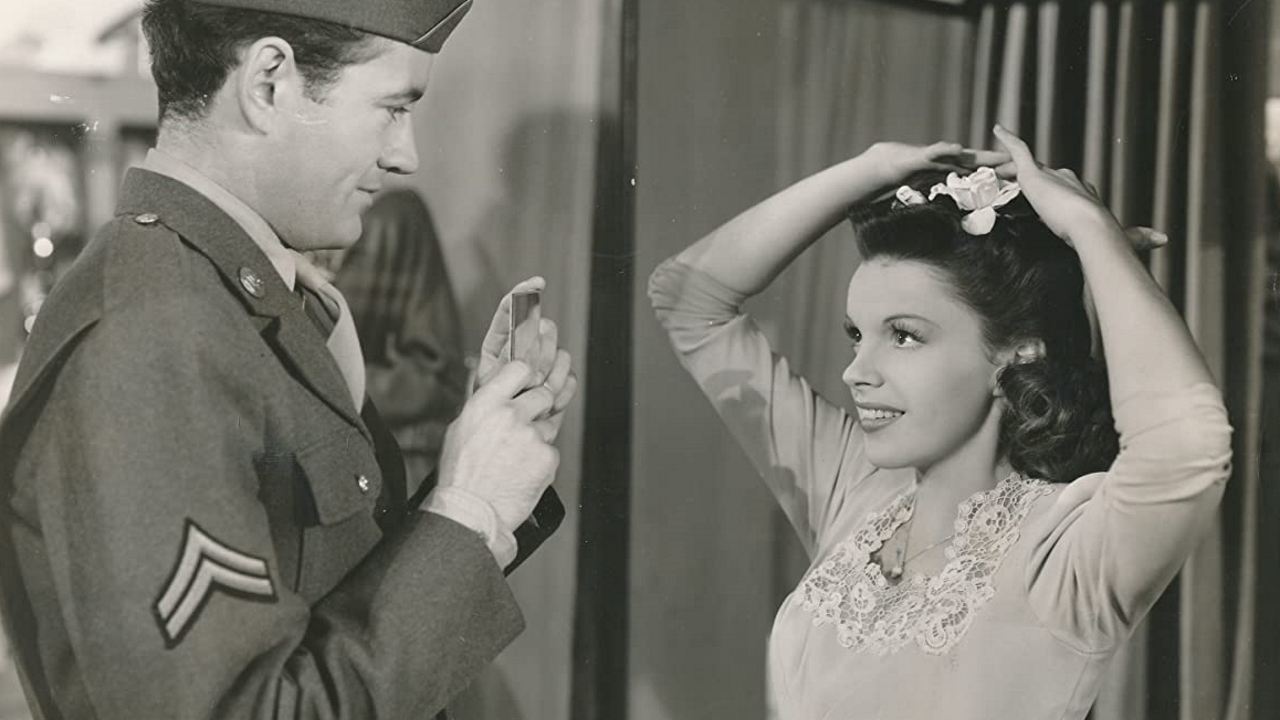weezeralfalfa
After having seen how many Judy Garland-starring musicals?, I was taken by surprise by this unheralded simple love story, released as WWII was winding down. Unfortunately, it had two things going against it for contemporary audiences. firstly, it was the only film until her 40s in which Judy didn't sing one song. Second, with its theme of an extreme shotgun wedding involving a boyish-looking soldier on a short shore leave and a girl he just accidentally met, probably many potential patrons stayed away, hoping to see something that didn't remind them of the now stale war. Nonetheless it was a heart-warming story appropriate for the times. It's often slow moving, with many awkward moments, when the tentative couple are unsure what to do next.To me, the film has a dream-like quality to it, rather like, yes, "The wizard of Oz"!. After all, the basic plot is hardly plausible, given all the psychological, practical, and legal barriers to this story actually happening the way it's presented. Judy's performance and some of the scene set ups also add to the dream-like quality. While Joe(Robert Walker) soon is sure that Alice(Judy) is a right girl for him, a shot-gun romantic dalliance with a fly-by-night nobody corporal, let alone marriage, goes against all Alice's stated principles. Besides, Joe has his heart set on returning to his Indiana small town and becoming a carpenter, whereas Alice says she hoes to stay in NYC, having moved there from the Midwest several years ago. But, Joe's extreme persistence, best exemplified by his running after the bus taking her home after they agree to part, finally begins to wear down Alice's formidable psychological defenses.I have one major criticism. Alice becomes very defensive at Joe's probing questions regarding her romantic life, while they are having dinner during their evening date. In fact, she almost leaves him there. Next thing we know, they are strolling through a woods(presumably Central Park), deep in thought and conversion about their relationship. Joe argues that clearly their accidental meeting in the train station was predestined by some higher power. Now, Alice says she agrees, implying that she might be ready to throw caution to the wind and accept a marriage proposal. A formal proposal doesn't come until they later loose contact with each other in the bustle of the subway station, and finally are reunited when both decide to go to the spot where they first bumped into each other. Meanwhile, they engage in a passionate kiss before realizing that the midnight clock has struck, and there are no more buses to take Alice home. While looking for a taxi, they are befriended by a milkman, who had begun his nightly delivery route. Thus begins the much more lively second portion of the film.Alice and Joe, being apparently ordinary conservative young people, with otherwise little in common, their interactions as a couple are mostly superficial and boring, excepting their several instances of nearly permanently losing touch with each other, and their exasperating experiences in trying to obtain a marriage license within 24 hrs. in a world where the usual absolute minimum is 3 days. Otherwise, it's some of the character actors and their interactions with these characters that provide much of the interest. There's James Gleason, as the friendly milkman, who gives them some go-ahead encouragement about their still wobbly relationship. There's Keenan Wynn, as a talkative drunk, who injects some badly needed excitement into the proceedings in one scene. Later, there are several characters involved in the mad race to obtain a marriage license before Joe has to leave. Usually, initially, they give the couple the run around, then try to help them skirt the normal bureaucratic maze when they realize their extreme time-limited situation.Curiously, after they finally extract a marriage license, they are remarkably somber while eating in a restaurant. Then, Judy begins to sob hysterically, complaining that she doesn't really feel married. It turns out that she really regrets the lack of a church wedding, not just the hurried civil ceremony. In lieu of a church ceremony, they enter a church and, without the benefit of a clergyman, say their wedding vows to each other, which they read from a pew book. In the parting scene, when Joe has to take the train to his ship, there is no crying by Alice. She is confident that Fate will take care of Joe and he will return in one piece to take her to his small town.While Walker was romancing Judy on screen, director Minnelli was romancing her off screen, and they would become engaged by the end of production. Judy had requested Minnelli as the finishing director, being dissatisfied with the original director.It turned out that Walker and Judy would once again be featured together, the next year, in the Jerome Kerns-honoring musical extravaganza "'Til the Clouds Roll By". Walker, playing Kerns, has another unlikely love-at-first-sight romance with another, while Judy played the historic singer Marilyn Miller.
atlasmb
This film depicts a small-town soldier (Robert Walker) on 48-hour leave in New York City. Confounded by the metropolis and its hurried pace, he latches onto a NYC resident (Judy Garland)who spends her time showing him the sights.In The Clock, the couple (Joe and Alice)is the focus of the film. Naturally, chemistry between the two is important to the success of the story. Robert Walker would not be my first choice for a romantic lead. On the other hand, he was brilliant playing a quirky role in Hitchcock's Strangers on a Train. Others on this site have acclaimed the chemistry in this film. For me, it was a little forced.Director Vincente Minnelli really tries to convince us that the couple is falling in love. Look closely and you will find his approach is very heavy-handed. During a key scene in Central Park, he practically forces the two into each other's arms by serenading them with sounds of the city, which are then enhanced by a full choir and music that practically shouts "destiny!" as the strings swell.The City of New York is a major character in this film. The two characters only have 48 hours to fall in love and make something of this relationship. The harried pace of NYC contributes to the feeling that time is running out for them. At the same time, the scenes of Penn Station, Central Park and The Metropolitan Museum of Art are mere backdrops, because the lovers only have eyes for each other.Minnelli relies heavily on montages to portray the passage of time and, for the most part, he is successful. Joe and Alice encounter all the denizens of the night who illustrate that, as much as NYC is a city of strangers, it is populated by individuals who can be quite giving and interesting. At the same time, city bureaucracy is a formidable obstacle that can only be conquered with the help of individuals who are willing to see a fellow human. And with love, of course.After the couple wins its race against the clock and city bureaucracy, notice how Minnelli brings the sound level down to a solemn level, then to silence in a pantomime scene. Finally, in a trackside scene, he shows us that Joe and Alice are only one example of the tableaux that are part of the wartime experience.The Clock is very watchable, even if you don't find the chemistry between Walker and Garland. If you buy into it, this is a fine romance.
kenjha
During WWII, sailor on two-day leave in NY meets a young woman and romance blossoms. This was the follow-up to "Meet Me in St. Louis" for Minnelli and Garland, and the pair wed shortly after this film was released. Garland and Walker (two actors who would have tragically short lives) work well together. This is a pleasant little movie, but nothing particularly memorable. The script is somewhat meandering, with random characters introduced (a milk man, a drunk) without rhyme or reason. It is perhaps too low-key and would have benefited from some dramatic developments in the plot or some more humor. A couple of songs by Judy would have enlivened things up a bit.
Petri Pelkonen
Corporal Joe Allen is a soldier who has a 48-hour leave.In Pennsylvania Station he meets Alice Mayberry after she trips over his duffel back and breaks the heel of her shoe.He takes her to a shoe-repair shop and their adventure together begins.Joe, who is a stranger in New York wants Alice to accompany him during his stay.Eventually Alice has to step on the bus.Joe starts running next to the bus wanting to meet her before he has to go.She promises to meet him under the clock at the Astor Hotel.She shows up there, a little late though, although Alice's roommate tells her to forget about this soldier.They miss the last bus home, so they accept a ride with a milkman, Al Henry.A flat tire and a drunk at a bar means they have to deliver the milk.In the morning they get a great breakfast made by Al's wife.They get lost from each other at a subway and they are reunited and they decide to get married.But it's not as simple as it sounds.There are some bureaucratic complications over the blood tests and the City Hall will be closed at 4 o'clock.But nothing can stop them from having each other.The Clock (1945) is directed by the female lead's future husband, Vincente Minnelli.Fred Zinnemann started the project.Arthur Freed is the producer, who also appears in the film.Also screenwriter Robert Naathan appears in the film.Robert Walker is terrific in the male lead.Judy Garland is terrific in her first motion picture in which she does not sing.And they were both having some personal problems during the filming.James Gleason makes his milkman really sympathetic.His real-life wife, Lucile Gleason gives a great performance as Al 'Emily' Henry.Keenan Wynn makes his drunk both funny and annoying at the same time.Ruth Brady is Helen the roommate.Marshall Thompson plays Bill.Angela Lansbury's mother, Moyna MacGill appears as Luncheonette Lady.This movie is close to perfect.It's got the greatest dialogue and the chemistry really works with the main couple.And it moves from one great scene to another.It's really sweet when they are at the Metropolitan Museum of Art getting to know each other having very little interest on the museum objects.It's a lot of fun to watch those two delivering the milk in the nightly New York after the real milkman has been knocked out by the drunk.It's most touching when Joe and Alice are separated in the subway and when they are finally reunited with her rushing into his arms.And it's real exciting to watch those two trying to beat the clock when they decide to get married.This is what romantic movies should be like.This was made with a feeling.Here we have this sympathetic couple you really want to find the happiness with each other.And in the end when Joe goes back to the war he will return to his love one.And they will have all the time in the world.You just know.After seeing a movie like this the world feels like a better place to live.At least for a while.



 AD
AD



